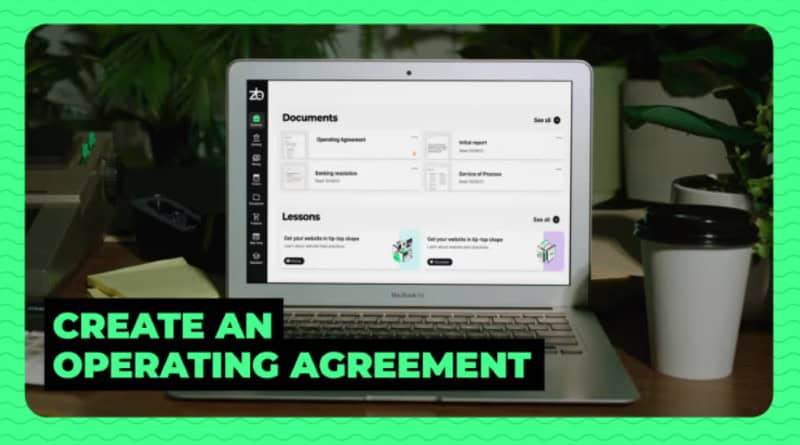We’re reader-supported. When you buy through links on our site, we may earn an affiliate commission.
Welcome to LLC 101! I’ve set-up LLCs for my businesses and I’ve been an entrepreneur for over 20 years so I can help you avoid common mistakes.
So pour yourself a nice glass of wine or whiskey or tea (with whiskey in it) and together we’ll set up an LLC for your company.
Extra Point: If at any point you want to bail and take the shortcut, I recommend Mark Cuban’s company ZenBusiness. For $199, they’ll take care of the government paperwork for you.
Did you know that 99.9%1 of all businesses in the U.S. are classified as small businesses? And many of those businesses are structured as limited liability companies (LLCs).
My businesses are LLCs, and the small businesses I’ve worked for were all LLCs.
So, let’s get started on how to set up an LLC!

Table of Contents
What Is an LLC and How Does It Work?
An LLC, or a “Limited Liability Company,” is a legal business structure that sets your business apart from your personal finances. As an entrepreneur, you can choose to register your business as an LLC.
Let’s start this LLC 101 guide with the main benefits of creating an LLC:
- Liability protection. You protect your personal assets in the case of legal issues or bankruptcy. (In other words, if someone sues your business, they can’t come after your house or car or pet parakeet, Sprite.)

- Pass-through taxation. You get flexibility when you file your taxes. With an LLC, you can choose whether to be taxed as a “sole proprietorship” or as a “corporation.” The idea is to pick the option that lets you pay less taxes.
See why creating an LLC makes sense? It’s the responsible and profitable choice for lots of entrepreneurs, no matter what type of business you’re starting.
New to the entrepreneurship game? Check out my article on how to make money online for beginners. Once you’ve got an idea, it will be time to think about creating an LLC!

How to Set Up an LLC
Okay, students, welcome to the next module in LLC 101: How to set up an LLC!
This short video explains how to set up an LLC:
Setting up an LLC is a 5-step process. It’s pretty simple, but you’ll need time to compile the information and fill out forms.
Want to make the process even easier? Then use an LLC service. I did research to find the best LLC service, and I’ve decided it’s ZenBusiness.
Prefer to do it yourself? Just make sure you follow the LLC 101 steps below (and consider using my more detailed LLC checklist).
Setting up an LLC is just one part of making your business legit and profitable.
I give out the insider details (like how to choose a business bank account and credit cards to get maximum cashback) in my free email newsletter:
Step 1 – Pick a Business Name
Before you can register your LLC, you have to name it.
Try to think of a name that’s:
- Unique
- Creative
- Simple
The unique part is the most important because it’s a legal requirement. You can’t choose a name that already exists in your state or a name that’s already federally trademarked.
If you’re not sure about your business name, combine an emotion with what you do.
Emotion + Industry = Your Business Name
Examples:
- Zen (Calm) + Business = ZenBusiness
- Touchdown (Excitement) + Money = Touchdown Money (my site)
Another option is to simply use your name. Or your name plus your industry
- Sam Walton + Market = Walmart
- Henry Ford + Motor Vehicles = Ford Motor Company
- Joe + Pizza =

If you get stuck trying to name your business, I’ll name it for $100. Click here and send me your email address and describe your business.
Before you start filing LLC-related paperwork, search the name on your state’s Secretary of State website and on the U.S. Patent and Trademark Office (USPTO) website.
You also have to end the official name with “Limited Liability Company” or “LLC.”
Extra Point: Buy your web domain name on Squarespace. This will prevent a jerk from stealing your web address.
Step 2 – Designate a Registered Agent
A Registered Agent sounds fancy, but it’s just someone who is registered to receive legal notices on your business’s behalf.
You could do it yourself, but you’d be required to be physically present at the designated address during regular business hours.
Here’s a short video explaining what is a registered agent:
In most states, you can be your own registered agent so long as your business has a physical address. Or you can have a company like ZenBusiness as your registered agent.
A huge drawback of being your own registered agent for your home-based business is that this reveals your home address. It’ll be all over the internet, public databases, and so on.
This makes it too easy for your social media stalkers, er, followers, and customers to knock on your door or know where you live.
If you don’t care about that, all good. But if you value your privacy, this is reason alone to use a registered agent like ZenBusiness along with a location-based virtual address with iPostal1.
I go into full detail here about how to avoid using home address for LLC.
Step 3 – Submit Articles of Organization
Articles of Organization sounds like another fancy term, but this is LLC 101, so let me simplify it for you. All we’re talking about here are the forms you send the state to officially register your LLC.
Each state will have its own forms, so head to your state’s Secretary of State website to find specifics.
Generally, the forms will cover basic information like:
- The name and purpose of your LLC
- The “location of operations” and your business address
- Your registered agent (and their address)
- The members (a.k.a. owners) of the LLC
- The management structure of your business (“member-managed” or “manager-managed”)
You’ll also have to pay a filing fee, which typically ranges from $40 to $500 (depending on the state).
Step 4 – Draft an Operating Agreement
An operating agreement is like your LLC’s constitution. It’s a legal document where you lay out how the company will be structured and managed.
While not all states require an operating agreement, drafting one is still a must-do in LLC 101. You don’t want to launch a business without a plan!

Is this your first time writing an operating agreement? ZenBusiness has a fantastic template that can make the process easier for you.
Step 5 – Get an Employer Identification Number (EIN)
An employer identification number (EIN) is a special ID number your business needs in order to hire employees and pay certain taxes.
And while getting an EIN isn’t technically required for all LLCs, it’s still a basic part of LLC 101.
I have EINs for my businesses. I’ve found it’s made it easier for me to get approved for the best business credit cards.
It’s super easy and free to get an EIN when you apply on the IRS website.2 An EIN will give your company the flexibility to hire employees in the future.
An EIN might also be necessary if you want a business bank account. Getting a business bank account is a good idea. Because you don’t want your business and personal finances all mixed up in a single account because the entire point of an LLC is to protect your personal finances in case your business is sued or goes bankrupt.
Learn more in my reviews of the
- Best banks for small business
- Best small business loans
- Best small business accounting software
- Financial planning for small businesses
- How to get a startup business loan with no money
Why Should You Set Up an LLC?
Now that you know how to set up an LLC, you might be wondering why you should create one in the first place?
There are 2 main benefits to having an LLC:
- You protect your personal assets (house, car, that vase with grandma’s ashes in it, etc.) from business-related issues like lawsuits or bankruptcy.
- You could pay less in taxes since you’ll have the flexibility to file as either a sole proprietorship or a corporation.
There are subtler benefits as well. For example, when you set up an LLC, you could bring other members on board, and some of them might offer additional funding.
There’s also the fact that having LLC at the end of your business’s name gives it more credibility, which is key for marketing.
Speaking of online marketing, check out:
- Best email marketing software
- Kartra vs ClickFunnels
- Best website builder
- Best web hosting services
- Best small business website design
- Best blogging platform
- Best managed WordPress hosting
Pros and Cons of Setting Up an LLC
This LLC 101 guide has already mentioned the benefits of setting up an LLC, but what about the potential drawbacks?
Let’s take a careful look at both the pros and the cons of LLC.
Pros:
- Your personal assets will be protected. Let’s say someone sues your business, or your business needs to file for bankruptcy. Having an LLC means your house and other personal assets won’t be in danger.
- You could save money on taxes. Having an LLC gives you more flexibility during tax season.
- Your business will seem more legit to customers. “The Citrus Squeeze” sounds like a lemonade stand. “The Citrus Squeeze, LLC” sounds like a titan of the beverage industry!
Cons:
- You’ll have to pay a filing fee. In some states, it’s $40 to $50. In others, you’ll have to pay hundreds of dollars to form your LLC.
- The LLC might dissolve if a member leaves. You can overcome this problem by including the right provisions in your operating agreement.
Remember, after you build your business you’ll want the option to put your online business for sale. This is how you can make millions of dollars like a number of people I’ve worked with have done.
Do you think it’s easier to sell a business that has its books together and is an official LLC, or a disorganized business operating as a sole proprietorship that co-mingles personal and business expenses?
Get your business documents together with the help of my free business newsletter:
Types of LLCs
At this point in our LLC 101 crash course, you should know why having an LLC makes sense and you should understand how to set up an LLC.
But what type of LLC should you create?
Yes, there are different types of LLCs. But don’t worry. The categories are straightforward, and you should have no trouble deciding which one your business will fall into.
Here are the most common types of LLCs:
- Domestic LLC. This is the “standard” LLC that operates in a single state, and it’s the ideal category for most small business owners.
- Foreign LLC. This is for businesses that are incorporated in one state but do business in others.
- Series LLC. This is for complex businesses that want a “parent” LLC along with smaller “sub-LLCs.” One advantage is that each sub-LLC acts as its own legal entity, which provides protection for the other LLCs in the series.
- Nonprofit LLCs. If your organization is for charity rather than profit, you can use this designation to get tax-exempt status.
- Low-Profit LLC. Also known as an “L3C.” It’s a hybrid of a standard LLC and a nonprofit LLC. This option (not offered in all states) is for businesses that earn a profit but also have a social mission.
- Professional LLC (PLLC). This designation is for licensed professionals like doctors, accountants, and lawyers.
- Anonymous LLC. Offered only in Delaware, Nevada, New Mexico, and Wyoming. This option lets you maintain your personal privacy while owning an LLC.
- Restricted LLC. Available just in Nevada, this type of entity can’t be taxed or distribute earnings for 10 years, making it useful mainly for passing assets from one person to another.
So you’ll pick one of the above LLC types, or if you set up your LLC with ZenBusiness they’ll guide you through it.
Common Questions About LLC 101
How Does an LLC Work For Dummies?
A limited liability company (LLC) is a legal business structure that helps entrepreneurs
- protect their personal assets from lawsuits,
- protect personal assets like your house and vehicles from bankruptcy, and
- allows you to potentially pay less in taxes.
When you create an LLC, you’re making it official that your business is a separate entity with no relation to your personal assets. That’s what gives you “limited liability.”
Let’s say someone sues your business. If your company is an LLC, they can go after your business-related assets – but they can’t touch personal assets like your house or collection of Star Wars action figures.
The liability is limited to only your business.
How Much Does an LLC Cost?
The filing fee for setting up an LLC varies by state, and it typically ranges from $40 to $500. If you use an LLC service like Mark Cuban’s ZenBusiness, you can also pay an annual fee of $199 to $349 per year for their LLC assistance.
LLC Requirements?
These are the basic requirements for setting up an LLC:
- A unique name
- A registered agent
- Articles of organization
- An operating agreement
- An employer identification number, or “EIN” (not always required, but recommended)
It’s not just ugly people who need an LLC. Even good-looking people like you and me need an LLC to protect our finances from lawsuit filers and bankruptcy courts.
Here are online business LLC ideas:
- How to make money as an attractive female
- How to make money as an attractive male
- How to make money on OnlyFans
- How to make money on OnlyFans as a couple
- How to make money on OnlyFans as a guy
How Do LLC Owners Make Money?
LLC owners (technically called “members”) make money when the profits of the company are distributed. These distributions are sometimes called “draws.” If you have a multi-member LLC, the process for distributing profits should be spelled out in your operating agreement.
LLC Owners make profits with business models like:
And with affiliate marketing:
- Temu affiliate program review
- Target affiliate program review
- Walmart affiliate program review
- Louis Vuitton affiliate program review
- Zara affiliate program review
- LEGO affiliate program review
- Samsung affiliate program review
- Sephora affiliate program review
- Chewy affiliate program review (fantastic for anyone that wants to start a pet care blog!)
- Farfetch affiliate program review
- Revolve affiliate program review
- Nike affiliate program review
How Is an LLC Taxed?
An LLC can choose to be taxed as a sole proprietorship or as a corporation. This flexibility is one of the main benefits of setting up an LLC. If you choose to file your taxes as a sole proprietorship, you’ll pay standard self-employment tax.
Should I Start an LLC For My Side Hustle?
Yes, you should start an LLC for your side hustle to protect your personal assets. The main benefit of an LLC is that your personal assets, like your home and vehicle, are protected if someone files a lawsuit against your business. And there are, unfortunately, lots of lawsuits in the world today.
For example, I’ve hired many part-time freelance writers who billed me as an LLC. And my businesses are registered as LLCs.
Mark Cuban’s company, ZenBusiness, makes it fast and affordable to start an LLC.
Here are some of my favorite LLC side hustles:
- Hobbies to make money
- Referral bonus apps
- Earn 20 dollars per referral
- Low-cost business ideas with high profit
- Business to start with 10k
- Most profitable online businesses
- How to turn 10k into 100k
- Business ideas for women
Are LLCs a Good Idea?
LLCs are a good idea for lots of entrepreneurs because they protect your personal assets, such as your house and vehicles, if someone were to sue your business. And remember, we live in a crazy world where anyone can sue anyone for anything.
If someone sues your business and that business is registered as an LLC, your house, car, and other personal assets aren’t in danger of being lost.
You can form an LLC yourself or use Mark Cuban’s company ZenBusiness.
LLC Meaning?
LLC stands for “limited liability company,” which is a legal business structure. Creating an LLC will protect your personal assets if your business faces bankruptcy or a lawsuit. It can also bring tax advantages since you’ll get to choose to file as a sole proprietorship or as a corporation.
But an LLC doesn’t mean much if you’re not making money with your business. Learn:
- How to make money as a video editor
- How to make money as a travel photographer
- How to make money on Audible
- How to make money as an independent artist
- How to make money on Facebook
- How to make money on Pinterest
- How to make 400 dollars fast
- How to make 600 dollars fast
- How to make 700 dollars fast
- How to make 800 dollars fast
- How to make 900 dollars fast
- How to make 3000 dollars fast
- How to make money fast
- How to double 10k quickly
- How to make more money
Related:
- Best VPN services
- Best small business firewall review
- Remote employee training
- Employee training software
- How to make 50k a month
- How to make 30k a month
- How to make 20k a month
- How to make 20000 dollars a week
- Jobs that pay 1 million dollars a month
- Jobs that pay over 1 million a year
- Betterment vs Acorns
Sources:
